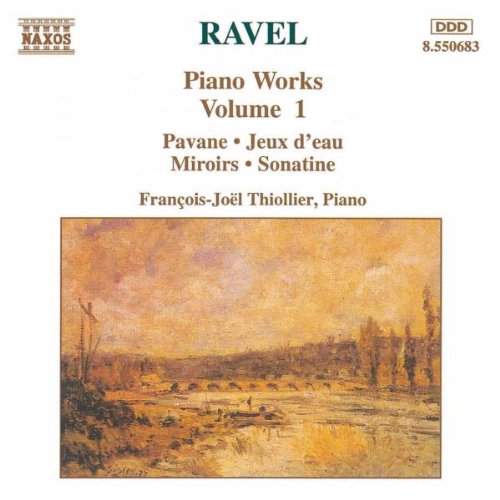Disco de Maurice Ravel: «Piano Works»

- Título:Piano Works
- Fecha de publicación:1994-11-29
- Tipo:Audio CD
- Sello discográfico:Naxos
- UPC:730099568326
- 1La parade
- 2 Pavane pour une infante defunteimg 5:47
- 3Sérénade grotesque
- 4A la Manière De. . . Chabrier
- 5À La Manière De Borodine
- 6 Menuet antiqueimg 5:42
- 7 Jeux d'eauimg 4:22
- 8Menuet sur le nom de Haydn
- 9Prld
- 10Son: Modere
- 11Son: Movt de Menuet
- 12Son: Anime
- 13Miroirs. Noctuelles
- 14Miroirs. Oiseaux tristes
- 15Miroirs. Une barque sur l'ocean
- 16 Miroirs: Alborada del graciosoimg 6:08
- 17Miroirs. La vallee des cloches
This CD of mostly early works finds Ravel at his most pictorial or atmospheric. 'La parade' is one of his most joyous works, an extended evocation of the carnivalesque, full of dances, marches and games, an untroubled vision of the kind of world he would view through a darkened glass in 'la Valse', bubbling with the kind of exuberant energy you find in Chabrier (one of the three composers Ravel pastiches in homage here along with Gounod, Borodin and Haydn). Dance is a common motif in Ravel, and informs the ghoulishly skittish 'Serenade Grotesque', the old-world eeriness of 'Menuet Antique' and the 'Alborada del gracioso' that bursts out of its muted surroundings in 'Miroirs'.
This movement is complemented by the more reflective side of Ravel's art, the indestructibly mournful 'Pavane pour une infante defunte', the dawn ripples of 'Jeux d'eau', or the sprightly, but generally low-key effects of 'Sonatine'. Pianist Thiollier is at ease in these various Ravelian idioms, alive to colour, mood and humour. when he comes to the famous 'Memoirs', however, more familiar in a sinister orchestral version, he doesn't seem to grasp the more diffuse, Debussy-like impresionism and, with the exception of the aforementioned toreador-strutting 'Alborada', makes it sound a bit dull.

